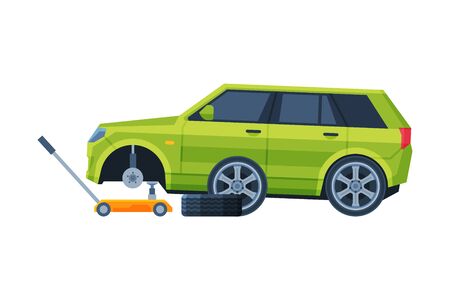Introduction: The Link Between Maintenance and Fuel Economy
If you’re like most drivers in the U.S., keeping fuel costs down is always top of mind. What many people don’t realize is that regular car maintenance doesn’t just extend your vehicle’s lifespan—it also plays a key role in boosting your gas mileage. From timely oil changes to proper tire inflation, simple upkeep can make a noticeable difference at the pump. In this article, we’ll break down how sticking to a consistent maintenance schedule not only keeps your car running smoothly but can also put real money back in your wallet by improving fuel economy. Whether you drive a compact sedan, a family SUV, or a rugged pickup, understanding the connection between maintenance and fuel efficiency is essential for every American driver looking to save on everyday expenses.
Tire Care and Proper Inflation
Taking care of your cars tires is one of the simplest yet most effective ways to boost fuel economy. When tires are underinflated, they create more rolling resistance, which forces your engine to work harder and burn more fuel. On the other hand, overinflated tires can reduce traction and negatively affect handling, putting your safety at risk. Keeping your tires at the manufacturers recommended pressure not only optimizes fuel efficiency but also extends tire life and ensures a smoother, safer ride.
Alignment also plays a significant role in how efficiently your car uses fuel. When wheels are misaligned, your tires drag instead of rolling freely, which increases fuel consumption and causes uneven tire wear. Regular alignment checks help maintain proper contact with the road and keep your steering responsive. To highlight the impact of proper tire maintenance, check out this comparison:
| Tire Condition | Fuel Efficiency Impact | Safety Impact |
|---|---|---|
| Properly Inflated & Aligned | Optimal MPG | Best traction and handling |
| Underinflated | -1 to -3 MPG | Increased risk of blowouts |
| Overinflated | Slight MPG gain, but reduced comfort | Less grip, longer stopping distance |
| Misaligned Wheels | -2 to -4 MPG | Poor steering response, uneven wear |
By making tire checks part of your regular maintenance routine—at least once a month or before long trips—you can make every gallon go further while keeping you and your passengers safe on the road.

3. Engine Tune-Ups and Oil Changes
Keeping up with regular engine tune-ups and timely oil changes is key to improving your car’s fuel economy. When your engine runs smoothly, it doesn’t have to work as hard, which means it uses less fuel on every drive. During a tune-up, mechanics check important components like spark plugs, filters, and belts to make sure everything’s in top shape. Worn-out or dirty parts can cause your engine to burn more gas than necessary. Using the right type of oil for your car is just as important. High-quality, manufacturer-recommended motor oil reduces friction inside the engine, helping it run more efficiently and use less fuel. In fact, using the wrong oil or letting it get old and dirty can actually hurt your gas mileage. By staying on schedule with oil changes and tune-ups, you’re not just protecting your engine—you’re also saving money at the pump and getting the most out of every gallon.
4. Air and Fuel Filter Replacement
Keeping your car’s air and fuel filters clean is a simple yet powerful way to boost fuel efficiency. Over time, these filters can become clogged with dirt, debris, and contaminants, which restricts the flow of air or fuel to your engine. When this happens, your engine has to work harder, leading to decreased performance and increased fuel consumption. By regularly replacing both air and fuel filters, you ensure optimal airflow and a proper fuel-air mixture, which results in smoother combustion and better gas mileage.
How Clean Filters Impact Fuel Economy
The main job of the air filter is to prevent dust and debris from entering the engine while allowing enough clean air for efficient combustion. Similarly, the fuel filter keeps impurities out of the fuel system. When either of these filters is dirty or clogged, it disrupts the ideal balance of fuel and air in your engine. This not only reduces power but also causes your vehicle to use more gas than necessary.
Benefits of Regular Filter Replacement
| Benefit | Description |
|---|---|
| Improved Airflow | Clean filters allow maximum air into the engine, supporting efficient fuel combustion. |
| Optimized Fuel-Air Mixture | A balanced mix leads to complete combustion, reducing wasted fuel. |
| Enhanced Engine Performance | The engine runs smoother and requires less effort for the same amount of power. |
| Better Gas Mileage | Less strain on the engine means fewer trips to the pump. |
When Should You Replace Your Filters?
Your owner’s manual will provide specific recommendations for filter replacement intervals. However, most experts suggest replacing the air filter every 12,000 to 15,000 miles and the fuel filter every 20,000 to 40,000 miles, depending on your driving conditions. Don’t wait until you notice symptoms like sluggish acceleration or decreased MPG—regular maintenance is key for keeping your ride efficient and cost-effective.
5. Spark Plug and Ignition System Maintenance
When it comes to boosting your car’s fuel economy, the condition of your spark plugs and ignition system plays a crucial role. Spark plugs are responsible for igniting the air-fuel mixture inside your engine’s cylinders, setting off the combustion process that powers your vehicle. If your spark plugs are dirty, worn out, or misfiring, they can cause incomplete combustion, which wastes fuel and reduces overall efficiency. Likewise, a faulty ignition system can lead to weak sparks or timing issues that further compromise how effectively your engine uses gas.
Regularly checking and replacing spark plugs according to your manufacturer’s recommendations ensures that each cylinder is firing properly. This helps your engine run smoother and burn fuel more efficiently. In addition, inspecting ignition wires, coils, and other components of the ignition system can prevent performance issues before they start. Well-maintained ignition systems deliver strong, consistent sparks that maximize power output while minimizing unnecessary fuel consumption.
In short, keeping up with spark plug and ignition system maintenance not only improves drivability but also puts less strain on your wallet at the pump. Even if you’re not noticing obvious problems like rough idling or trouble starting, routine checks are a smart way to protect both your car and your budget in the long run.
6. Addressing Warning Lights and Small Repairs
One of the most overlooked aspects of car maintenance is paying attention to dashboard warning lights and taking care of small repairs as soon as they arise. Those little icons that light up on your dashboard aren’t just for show—they’re your car’s way of letting you know something needs attention. Ignoring warning lights, even if the car seems to be running fine, can lead to bigger, more expensive problems down the road—and it can hurt your fuel economy, too.
When you see a check engine light or any other warning indicator, it’s important to get your vehicle checked out promptly. Many times, these alerts signal issues like a faulty oxygen sensor or a loose gas cap, both of which can cause your engine to run less efficiently and burn more fuel. Addressing these minor issues quickly keeps your car running smoothly and helps maintain optimal fuel efficiency.
Small repairs—like fixing a misfiring spark plug, replacing worn belts, or sealing minor leaks—might not seem urgent, but neglecting them can make your engine work harder than it should. This extra strain leads to increased fuel consumption and could eventually result in major mechanical failures.
Ultimately, taking action as soon as a warning light appears or a minor problem is detected is not just about keeping your car safe; it’s also about saving money at the pump and preventing expensive repairs in the future. Staying proactive with these small fixes is an easy way to keep your vehicle efficient and reliable for years to come.
7. Conclusion: A Win-Win for Your Wallet and the Environment
Regular vehicle maintenance isn’t just about keeping your car running smoothly—it’s a smart investment that pays off in more ways than one. By taking care of routine services like oil changes, air filter replacements, and proper tire inflation, you’re not only saving money at the gas pump but also extending the life of your car. These small steps add up over time, reducing the risk of expensive repairs down the road and keeping more cash in your wallet. Plus, improved fuel economy means your car burns less fuel and emits fewer greenhouse gases, helping you lower your carbon footprint. Staying on top of maintenance is a simple way to make a positive impact—on both your finances and the environment. So next time you’re tempted to skip that service appointment, remember: regular upkeep is a win-win for you and the planet.


